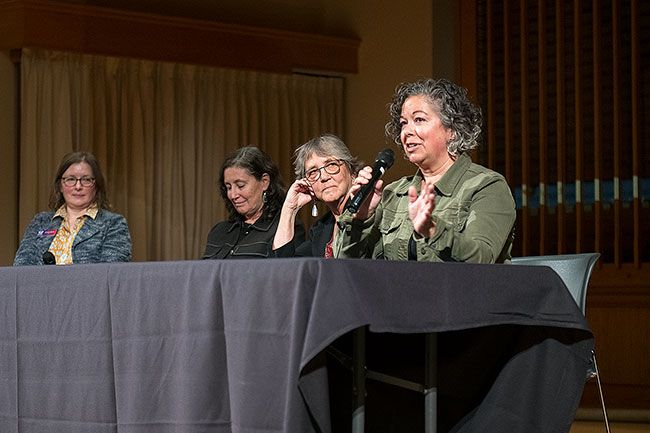‘For the Record’ film serves as warning to hometown papers

The 45-minute documentary follows the life of editor Laurie Ezzell Brown as she fights to keep alive her family owned weekly paper, “The Canadian Record,” in Canadian, Texas. The film was shown at the Ice Auditorium in Melrose Hall on the Linfield University campus Wednesday, Oct. 23..
“My parents started this paper in 1947. I don’t want to close the doors,” Brown states in the film. “But there have been weeks when I wasn’t sure we were gonna be able to keep going, when I was publishing a newspaper that was costing me more than I was making.”
Advertising had provided 90% of the publication’s revenue, which is the standard model for newspapers.
“That model is failing,” Brown said.
In a sea of the red GOP in the Texas Panhandle, Brown and ‘The Canadian Record’ an island of liberal thought and editorials reflected this; however, community members put party politics aside and enjoyed the local newspaper.
In the film, locals were interviewed and criticized national and state level political coverage, as the creditability of the publications and broadcasters were questioned, but they didn’t have that issue with The Record on local topics.
“The fact is that journalism is being denounced,” said Brown, “and there’s no longer much value being placed on the truth, is just about the scariest thing I’ve ever seen.”
In the wake of Covid, the local economy of Canadian was hit hard and the paper’s advertisers began to pull their ads, such as the used car dealer who hadn’t sold a vehicle in months. Long-term staff had to accept new job opportunities and moved out of state due to the financial crunch. Brown’s printing costs went up 70% one year.
Brown wanted to throw in the towel several times, but held on.
She advertised in the paper that the publication was up for sale. She had an offer, but decided in the end she did not trust the buyer to take over. “The Canadian Record” closed shop March 2023 after 131 years. Brown now publishes online only and on social media.
The panel discussion featured Brown as well as the film’s director, Heather Courtney; Dr. Jennifer Rauch, chairman of the Linfield Journalism and Media Studies program; and Chelsea Marr, publisher of the Columbia Gorge News and president of the Oregon Newspaper Publishers Association.
During filming, Brown was discouraged with the divisions in the country and was trying to grapple with them in her own heart and then rapidly in the newspaper, but then her opinions affected the papers advertising.
“I think it’s important for (readers) to see a different point of view, to hear, to read a different point of view than the prevailing point of view in Texas,” she said.
Courtney said when making the film she learned how vital small-town community papers are and that they, too, are facing a difficult time in the nation.
Asked if communities feel the loss of newspapers, Brown said she can’t speak for all communities, only for hers, which has not had a paper for over a year.
“I have trouble going to the post office, because I am covered with people saying ‘we miss the newspaper,” she said.
As a journalist, she fought for government transparency. One example was her insistence that public meetings need to be in a room large enough to accommodate the public and not just the board. This was after she had to cram herself between the wall and doorway to attend a school board meeting. The room only fit the board and their conference table. Later, the local school board had to remodel and expand the room. Brown was there ready with her camera.
Brown said communities without a local paper are missing out on necessary information and government transparency, they just don’t know it.
“I think it is a great tragedy in Oregon that all these small newspapers are being bought up,” she said.
Chelsea Marr, publisher of the Columbia Gorge News, agreed and has seen the closure of long-time community papers first hand. In April 2020, Marr purchased and merged The Dallas Chronicle, Hood River News and White Salmon Enterprise into the CGN after owner Eagle Newspapers decided to close the papers. She said the best thing people can do to support local publications is subscribe.
“It gets harder and harder as a different generation coming up doesn’t see the value in a print paper that many people have grown up with,” she said.
“Returning to the question that Laurie asked at the beginning of the documentary ‘who will tell these stories is she doesn’t?’ And sadly, the answer is nobody, these stories are not being told,” Rauch said.
“More than half of original news still comes from local newspapers,” she said. “Most of the news that circulates in our digital sphere is just aggregation and opinion and commentary on things that people on the ground have been digging up and making public for us.”
There is also a lot of evidence that local newspapers and journalism reduce polarization. They help create a local identity that people bond with, she said.
Courtney called for more of a focus on community news in journalism school curriculum.
When asked what additional funding sources there are, Courtney said due to small staff it is hard for community papers to figure out how to be a nonprofit. They need not just money but resource teams to teach papers how to change their financial model.
She suggested Press Forward, a national coalition focus on strengthening democracy by revitalizing local news and information. Press Forward partners are moving from individual grantmaking strategies to a shared vision and coordinated action.
Locally, Oregon Public Information Partnership was founded by Jeb Bladine, publisher of the News-Register. In response to financial challenges facing newspapers, OPIP and the newspaper partnered with Linfield to put on the “For The Record” event.
“It’s difficult when you realize I can create a newspaper and do all the hard work and put it online in a minute and all I have to do is get people to look at it,” Brown said.
“For the Record” has been shown across the U.S. and at some showings, youth in the crowd spoke with Brown about their passion and desire to be journalists.
“I asked them all, ‘Hadn’t you heard newspapers are dying?’ They said ‘I feel like I’m making a difference.’ That’s something you don’t get from a lot of other jobs and they brought tears to my eyes, because that’s why I published the newspaper for 40 years. That’s why my dad did it. You don’t get that from just any job,” Brown said.
The Canadian Record’s demise is just one example of the decline in local print media. More than 25% of newspapers in the U.S. have closed since 2005. According to Medill Local News Initiative, the U.S. is currently losing 2.5 newspapers a week. In Oregon, the number is closer to 40% that have closed their doors in the last two decades.
Two weeks ago, the newspaper serving Columbia County closed, after the St. Helens and Clatskanie papers were merged in 2023 by new owners. Wednesday, Oct. 23, EO Media Group, which owns a dozen newspapers in mostly rural areas of Oregon and Southwest Washington, announced it has been sold to Mississippi-based media firm Carpenter Media Group.











Comments